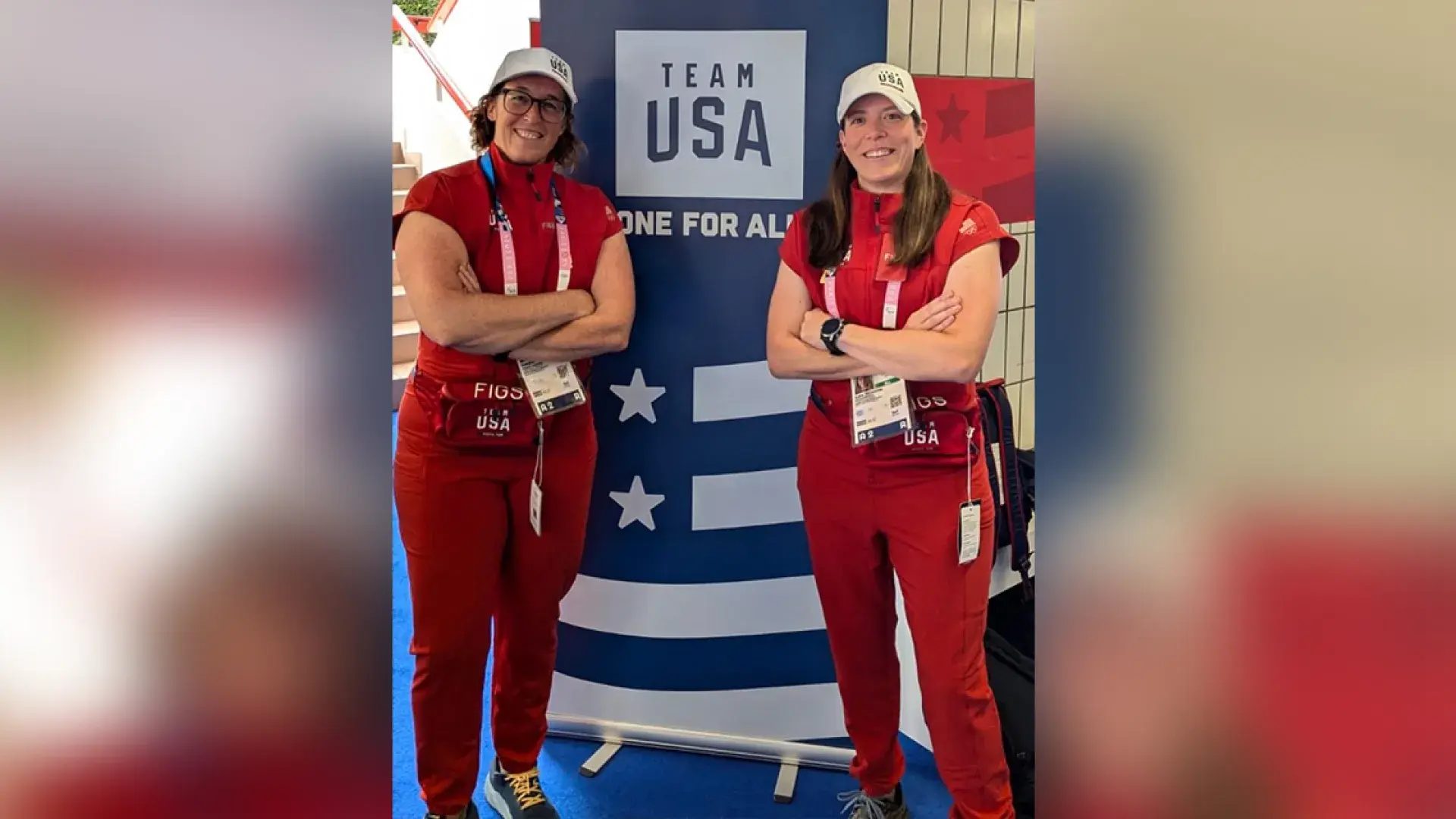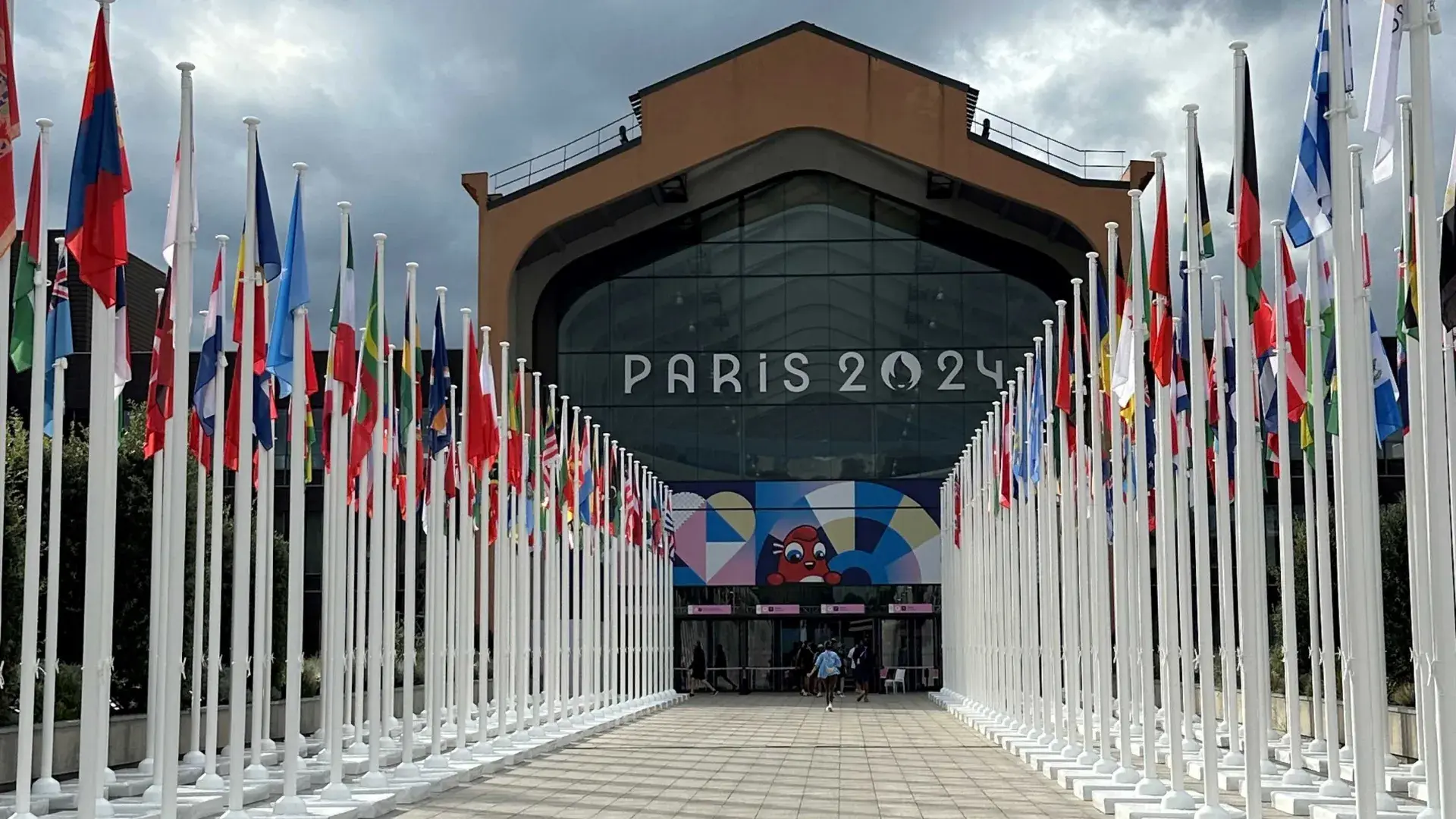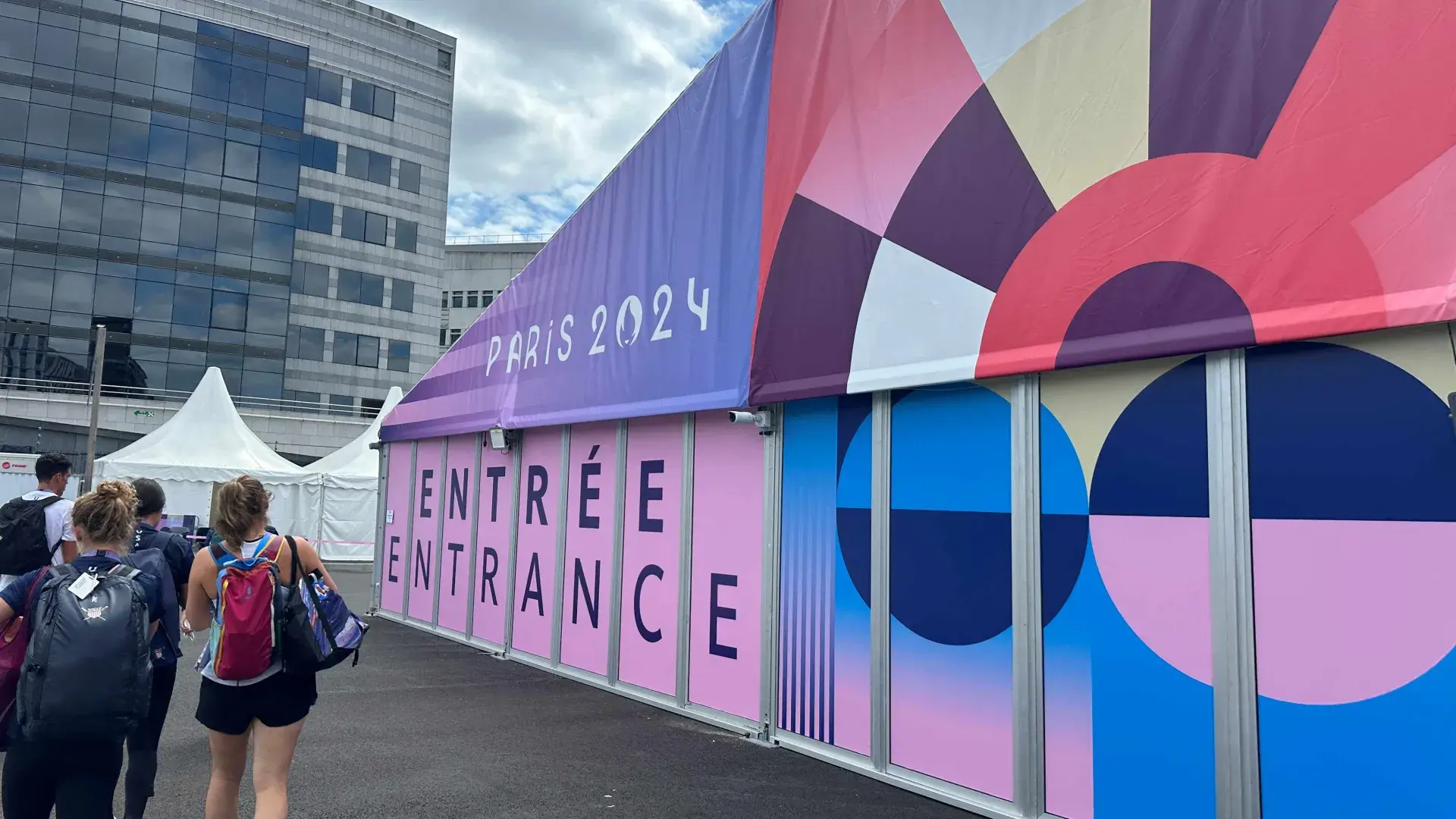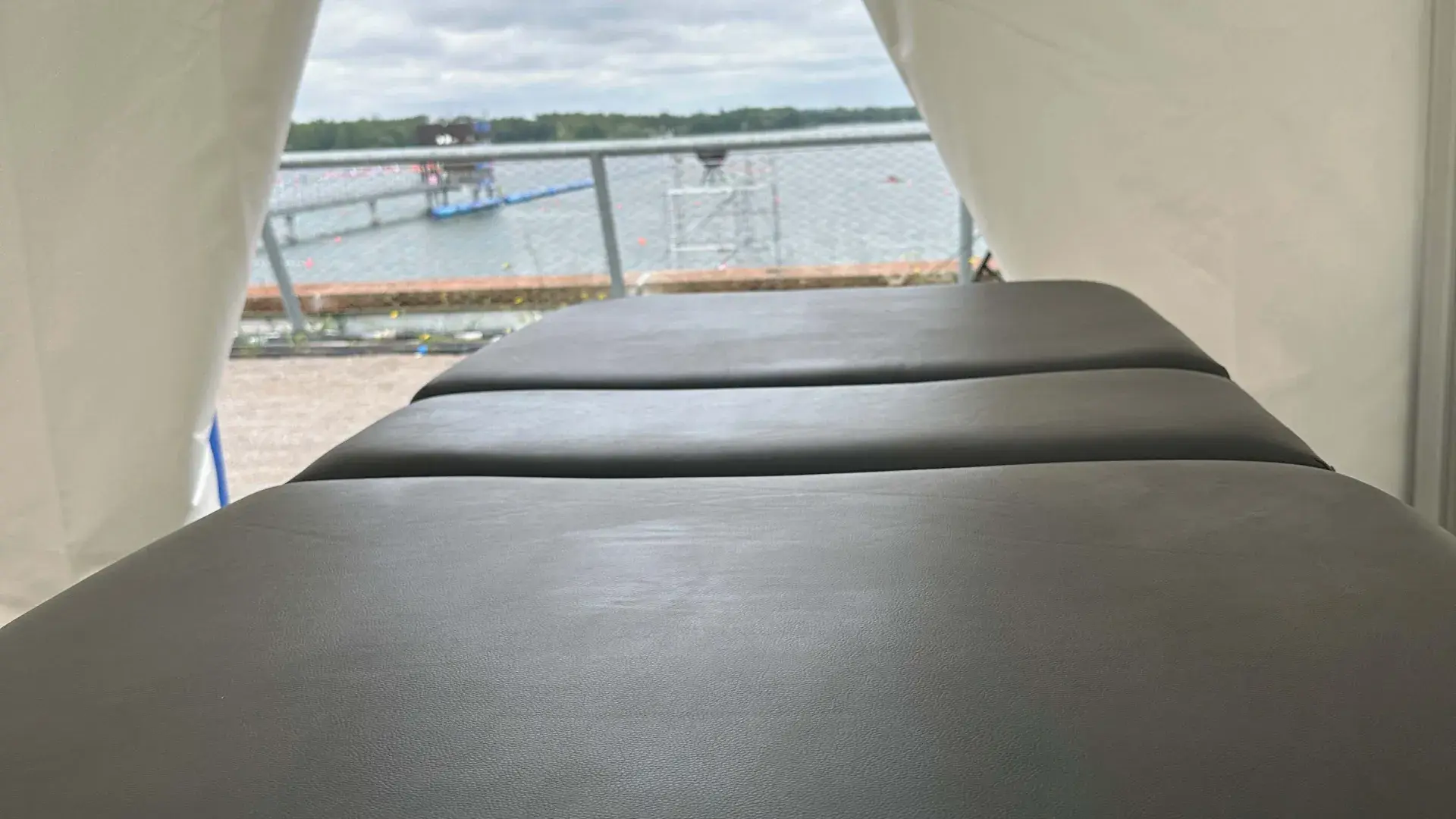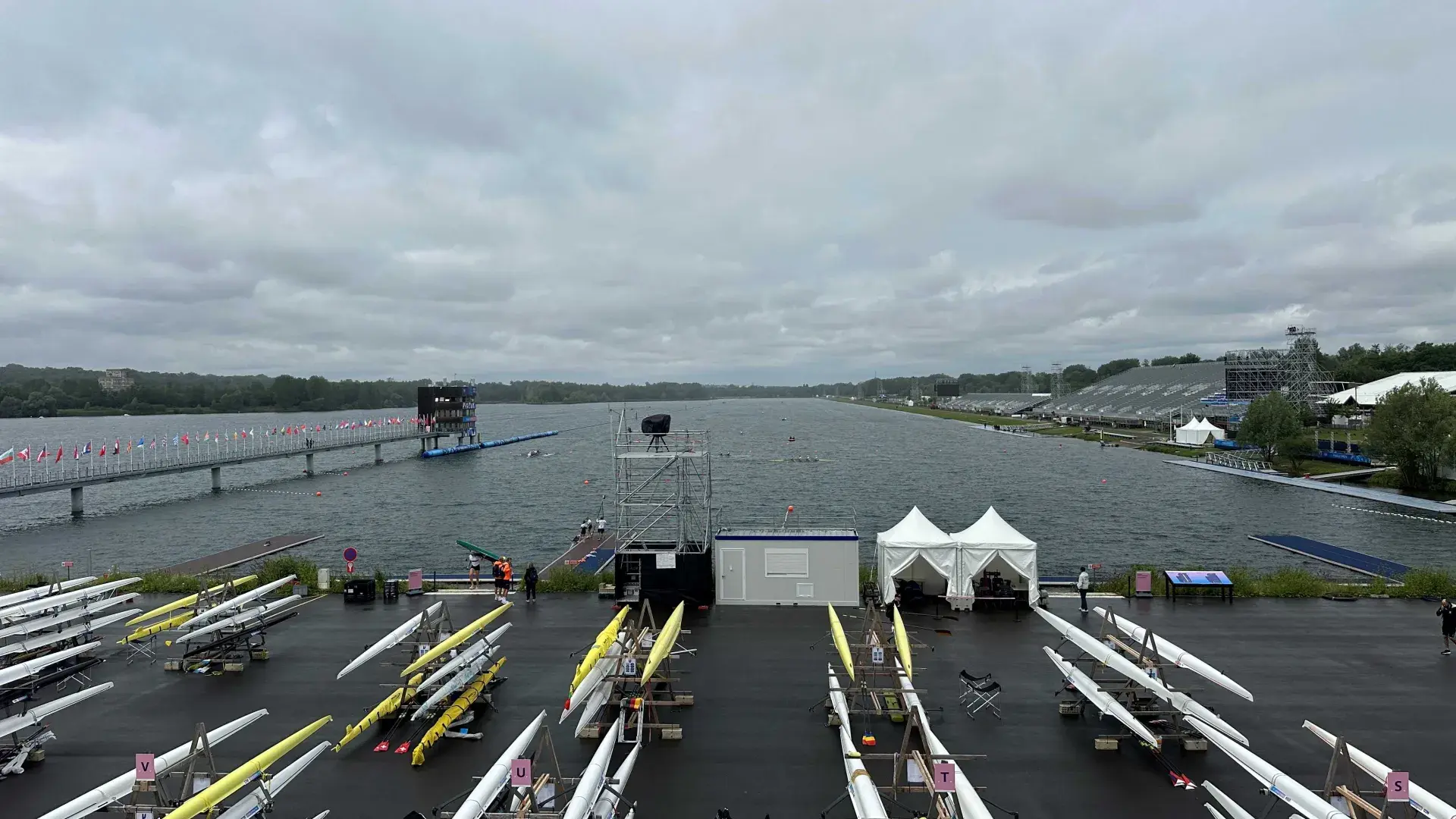
The USRowing physical therapist says working the Olympic Games “never gets old;” is doing all she can to ensure all rowers reach the starting line healthy
Towering above the sprawling gray rooftops in Paris, the Eiffel Tower is in full view from the Athlete’s Village where MGH Institute alumna Deirdre McLoughlin will be living for the next 17 days. But it’s the Olympic rings hanging on the Tower’s south side that stand out, serving as a vivid symbol of the mission McLoughlin is part of – to help Team USA’s men and women’s rowing teams bring home the gold.
“It’s always a moving experience to enter the Athlete Village on the first day- – even at my third Games!” said McLoughlin, who arrived in Paris with USRowing earlier this week. “Being able to walk around off campus as opposed to the absolute lockdown we were all in at Tokyo feels especially delightful.”
McLoughlin, DPT ’09, was a team physical therapist at the 2020 Games in Tokyo that were delayed to 2021 because of the COVID-19 pandemic, and before then, she was there during the 2016 Olympic Games in Rio. Now, the 12-year veteran of the USRowing Sports Medicine Staff is with the team for her third Olympics – a privilege and responsibility she’s never taken lightly.
“I never started my practice thinking I would end up at the Olympics,” said McLoughlin, who owns and operates a small private practice in California called Resolute Rehab. “I could have a big practice with 20 employees, but what I feel really satisfied about is knowing that these athletes would trust me to work on them the night before the Olympic final. They trust putting all they have worked for into my hands.”
Read how Deirdre McLoughlin went from the Institute to the Olympics in Part One.
McLoughlin is helping treat 42 men and women rowers who will compete in 12 different races at the Vaires-sur-Marne Nautical Stadium, from a women’s singles race to the men's and women’s races of eight people per boat. She’s traveled around the world with these athletes in preparation for these Games, from the men’s training center in Oakland, CA, to a training stop in New Jersey, to another training camp in Italy, which served as the team’s final stop before Paris.
Walking into the Athlete’s Village after a long travel day from Italy to Paris was surreal, McLoughlin said. From the Athlete’s Village, located in the center of Paris, the rowing team took an hourlong bus ride to the rowing stadium on the city’s outskirts near Disneyland Paris. The team quickly got down to business, setting up physical therapy tables and finding athlete rest areas, although McLoughlin said their set-up and race schedules may change based on weather.
“Some of my patients think it's very glamorous,” McLoughlin said. “Sometimes we're out here, and it's a beautiful, sunny day, and sometimes it's pouring rain and freezing cold, and you have to work and get your rain boots on. The day is not always as glamorous as getting new gear and taking a picture.”
McLoughlin admits the new gear is a perk, noting the haul of Team USA branded merchandise she received in advance of the Games — most of which she intends to share with family and friends. Scrubs company FIGS even donated flaming red jumpsuits for the U.S. Olympic medical staff, which McLoughlin jokingly said all the athletes want to steal. Yet for McLoughlin, the real “measure of success” isn’t an Olympic swag bag — it’s the knowledge that every athlete is healthy enough to compete.
“Obviously, we want them to win medals - that’s their job. My job is to make sure everyone is at full strength, full capacity, and can get to the starting line,” she said.
Although back, hip, and shoulder injuries are common among rowers, McLoughlin hopes no unexpected injuries arise during the Olympics. Should athletes become injured, she needs to quickly make calls that benefit the entire team, not only the injured athlete. Some of these athletes have spent eight years training to compete at the Olympic level, and as their physical therapist, McLoughlin feels a unique sense of pressure to help them maximize this “one shot.”
“With my regular patients at home, you can take a day off, but you can’t really do that here,” she said. “Taking time off will maybe help the athlete if my assessment’s correct, but it can detract from the boat because now they’re missing someone, so you have to make sure that resting is really the right call.”
Even recommending an athlete skips a workout on the ergometer rowing machine can throw off the team, shaking an athlete’s confidence in their abilities, she noted.
“You have to be convincing, but not alarmist because you need to have them feel like they have confidence. You can’t say, ‘I’m really worried, I’m not sure if your back’s going to make it,’” said McLoughlin, who hopes that she’s earned enough trust through years of training these athletes to back up her decision-making.
Having worked at dozens of high-stakes regattas, rowers sometimes turn to McLoughlin for moral support, seeking more than physical therapy when they approach her treatment table.
“They can get on the table and either use that time to be really quiet, or they can relax, or they can talk about things,” noted McLoughlin. “It’s a real privilege and an honor to be on the inside and try to do whatever it is the athlete needs to perform their best.”
She’s already experienced multiple emotional moments in the months leading up to the Summer Games, including when athletes were vying for a spot on the Olympic team. Team USA qualified most of its eligible boats during the World Rowing Championships last year, but “the most stressful regatta” happened this past May, when the remaining Olympic hopefuls competed for the last few spots.
“No one wants to talk about this part, but the Olympic trials were a lot more devastating than the Olympics,” McLoughlin said, describing one scenario in which two boats competed for only one remaining slot.
“I know all these athletes, and it’s heartbreaking to watch their Olympic dreams dissolve,” recounted McLoughlin. “The TV Olympics are full of joy and excitement, but in the behind-the-scenes Olympics, not everybody's going to get a medal. There's going to be a lot of devastation and heartbreak.”
For the lucky few who earned a chance to be here in Paris, McLoughlin says she’s played only a “small part” in their success — and hopes it stays that way.
“Getting all the gear’s fun and being able to be there and take a picture with the rings is obviously extremely exciting, but we're here for the athletes. It's their Olympics. That's them, and all the pieces that went into their training to get to this place. I don't want to have to play a big part.”
Olympic rowing begins Saturday, July 27 and will conclude Saturday, August 3 with medals races.
Do you have a story the Office of Strategic Communications should know about? If so, let us know.
